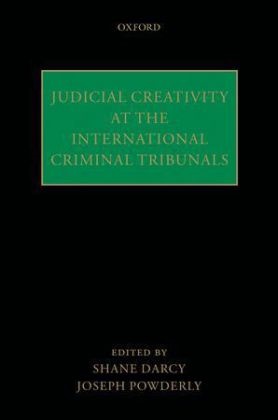Read more
Zusatztext I expect the volume to be widely read. It is bound to be of great interest to practitioners and judges involved in international criminal trials. It will plainly attract significant academic interest. It will also repay study by those who are interested in the role played by judges in general in the development of law in the domestic as well as the international field. In addition it provides insight into the historical role and development, as well as the work in general, of the international criminal tribunals Informationen zum Autor Dr. Shane Darcy is a lecturer at the Irish Centre for Human Rights, National University of Ireland, Galway He holds a Ph.D and LL.M in international human rights law from the National University of Ireland, Galway and ahs published widely in the fields of international humanitarian law, criminal law and human rights law.Joseph Powderly is Researcher in International Criminal and Humanitarian Law at the T.M.C. Asser Instituut in The Hague. He is a Ph.D. candidate at the Irish Centre for Human Rights, National University of Ireland, Galway, and is a recipient of a Postgraduate Research Scholarship from Irish Research Council for the Humanities and Social Sciences. Klappentext As the work of the International Criminal Tribunals for the Former Yogoslavia and Rwanda draws to a close! this edited collection appraises their impact. It particularly focuses on the position of judges as lawmakers within these tribunals! shedding light on the profound changes in international criminal law which these judges have instigated. Zusammenfassung As the work of the International Criminal Tribunals for the Former Yogoslavia and Rwanda draws to a close, this edited collection appraises their impact. It particularly focuses on the position of judges as lawmakers within these tribunals, shedding light on the profound changes in international criminal law which these judges have instigated. Inhaltsverzeichnis Shane Darcy and Joe Powderly: Introduction; Part I - Sources of Law and Judicial Interpretation; 1: Joseph Powderly: Judicial Interpretation at the ad hoc Tribunals: Method from Chaos?; 2: Fabián Raimondo: General Principles of Law! Judicial Creativity and the Development of International Criminal Law; Part II - Definition of Crimes; 3: William A. Schabas: Judicial Activism and the Crime of Genocide; 4: L.J. van den Herik: Using Custom to Reconceptualize Crimes Against Humanity; 5: Shane Darcy: The Reinvention of War Crimes by the International Criminal Tribunals; 6: Niamh Hayes: Creating a Definition of Rape in International Law: the Contribution of the International Criminal Tribunals; Part III - Forms of Criminal Liability; 7: Robert Cryer: The ad hoc Tribunals and the Law of Command Responsibility: A Quiet Earthquake; 8: Mohamed Shahabuddeen: Judicial Creativity and Joint Criminal Enterprise; 9: Gideon Boas: Omission Liability at the International Criminal Tribunals - A Case for Reform; Part IV - Defences and Fair Trial Rights; 10: Caroline Fournet: The Judicial Development of the Law of Defences by the International Criminal Tribunals; 11: Gillian Higgins: The Development of the Right to Self Representation before the International Criminal Tribunals; 12: Wayne Jordash & John Coughlan: The Right to be Informed of the Nature and Cause of the Charges: A Potentially Formidable Jurisprudential Legacy; Part V - Procedure; 13: Göran Sluiter: Procedural Lawmaking at the International Criminal Tribunals; 14: Hakan Friman: Trying Cases at the International Criminal Tribunals in the Absence of the Accused?; 15: Fidelma Donlon: The Role of the Judges in the Definition and Implementation of the Completion Strategies of the International Criminal Tribunals ...

